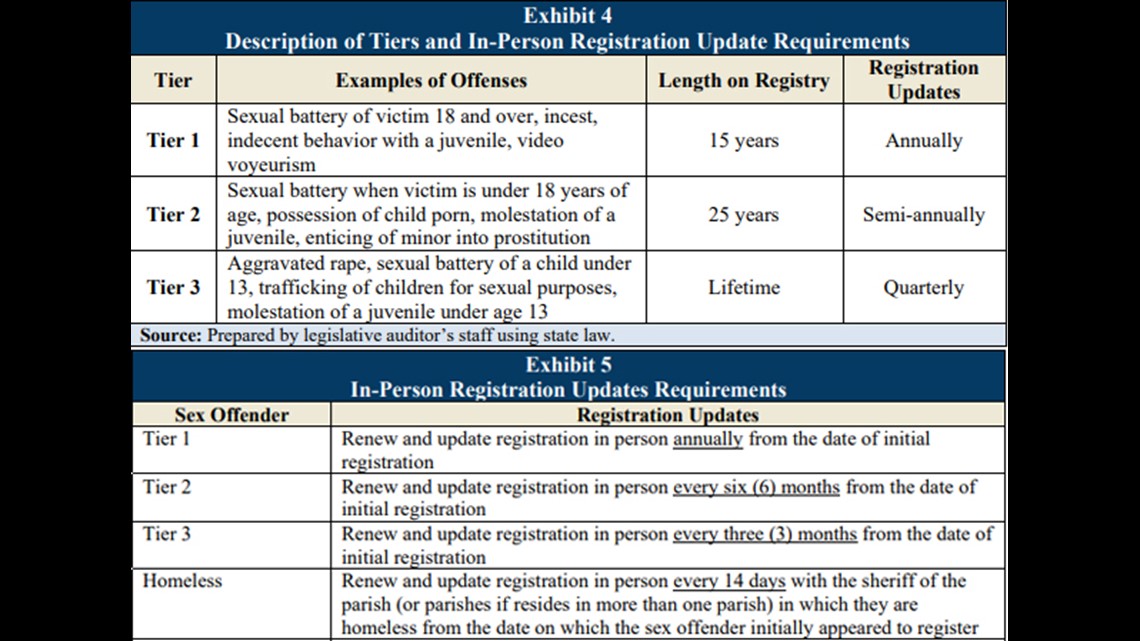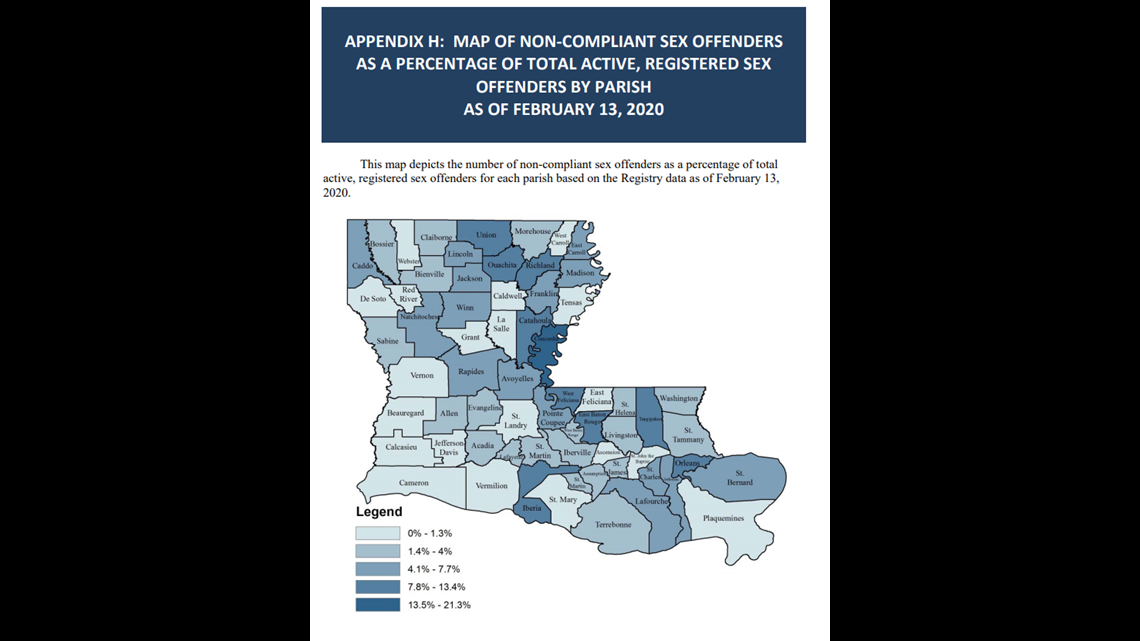NEW ORLEANS — One registered sex offender's girlfriend called and said he was dead. Local law enforcement removed his name from the registry without checking if it was true.
Another was convicted of a felony, resetting the clock on his removal from the registry. But because nobody updated the state database with the new conviction, his name is set to drop off the list before it legally should.
A lifetime-registered sex offender hadn't been to his seasonal check-ups with his local law enforcement agency in 11 years. But the agency never alerted anybody and continued marking him as active and compliant in the registry.
These are some of the anecdotes used by the Louisiana Legislative Auditor's Office to underscore multiple oversight failures in how agencies across Louisiana manage and keep track of registered sex offenders.
Their findings were released Tuesday in a 59-page document sent to the governor, state attorney general and other public officials.
As of February, there are more than 11,000 registered sex offenders in the state. They are separated into three categories: Tier 1 offenders must register for 15 years; Tier 2 offenders are on the list for 25 years; Tier 3 offenders are registered for life and have the strictest check-in requirements.


While no sex offenders had been left off the registry completely, auditors found that none of the agencies using the registry is responsible for making sure it is accurate and updated regularly.
RELATED: Accused of molesting several girls over decades; man has never been sentenced to jail for it
Local law enforcement agencies, called management agencies, did not have a cohesive standard for how information should be put into the database or what to do if a sex offender didn't comply with the restrictions.
A 2008 audit found the same issues, but no changes have been made in the past 12 years to how the system is administered.
The issues found by the auditing team ranged in scope, from missing employment verification to incorrect identifying information such as social security numbers.
In a survey of 79 sex offenders on the registry, approximately 60% were classified in the wrong tier. For most, this meant they were classified as a higher tier than they should have been, and had their names on the registry for more time then legally required.
Because only Tier 1 and 2 offenders are normally reviewed by the state's Sexual Predator Apprehension Team -- usually one year ahead of their assigned date to be struck from the registry -- an offender incorrectly placed in Tier 3 could pay fines and be forced to register for life without legal justification.
On the other side, 17 of the sex offenders reviewed were placed in lower tiers than they should have been, meaning they would be removed from the sex offender registry before they should be -- if they should be removed at all.
In some cases, even tracking sex offenders by their basic information raised challenges. At least 425 sex offenders had invalid or blank social security numbers in the registry. In at least three cases, the same number was used for multiple offenders. And auditors found two cases where incorrectly logged information made it look like offenders were younger than 10 years old.
And employment data -- which an offender is required to report within three days -- was not up to date for the majority of sex offenders the state checked.
Using workforce data, auditors found 421 sexual offenders who didn't have a job listed. In a majority of the cases, they hadn't told their managing agency about the job. But in roughly a quarter of the cases reviewed, the managing agency simply never put that information into the registry, where it would have been publicly displayed.
The agency found at least 721 offenders who were at least two months late for their required check-ins with law enforcement, with the longest gap being 11 years, during which the lifetime offender told auditors he thought his name had been removed from the registry.
He had never been marked as non-compliant with his check-ins and the management agency in charge of him never looked to get a warrant for failing to appear.
Across the state, about 4.5% of registered sex offenders are listed as non-compliant, according to state data.


In Orleans Parish, that number is much higher. The NOPD reported 55 non-compliant sex offenders out of 550, meaning about 10% were not completing required regular updates. Only three parishes have a higher percentage of non-compliant offenders.
But the New Orleans Police Department receives the third-most state funding in the state from a fund designed to offset the costs of checking on sex offenders -- approximately $43,000.
The solution auditors found to most, if not all of these problems, was legislation designating one of the agencies involved in the registry's upkeep as the official agency responsible for it. They said the Louisiana State Police would be the most likely candidate for the job.
But LSP officials balked at taking on the responsibility of managing the sex offender registry, saying they didn't have the manpower or the authority to do so.
It is likely that the state police will be able to continue avoiding the burden of registry management for the immediate future. There is seemingly no legislative interest in addressing the issues laid out in the audit, and the 2008 one before it. Despite state auditors finding many of the same oversight problems then, there has been no legislation put forward in the 12 years between the audits aimed at consolidating the responsibility for the sex offender registry.
In the meantime, at least 62 sex offenders don't even have a schedule set up in the registry for check-ins, meaning there is no way to track whether they have been keeping law enforcement officials up to date with their information.
More Stories:
► Get breaking news from your neighborhood delivered directly to you by downloading the new FREE WWL-TV News app now in the IOS App Store or Google Play.



